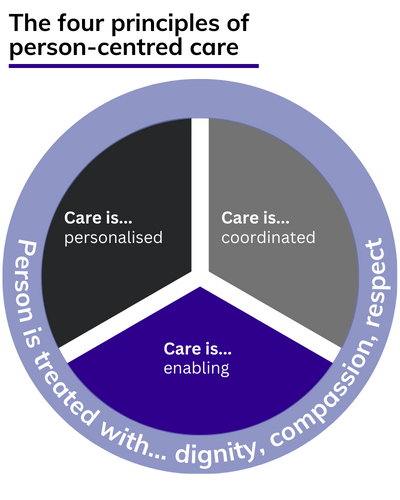
| 11 July 2018
There are many terms used to describe person-centred care, including ‘patient-centred care’, ‘resident-centred care’, ‘client-centred care’ or ‘woman-centred care’. Each of these terms is used within specific contexts (e.g. palliative or end-of-life care) but they all describe the same approach to care provision.
The meaning of person-centred care
Person-centred care is a term used to describe care which is responsive to an individual’s personal circumstances, values, needs and preferences. By adhering to person-centred care principles, staff are empowered to cut through the processes and systems to provide care which is specific to the patient’s individual requirements.
The aim of a person-centred care approach
By focusing on person-centred care, it is hoped that the NHS will provide improved patient experience. The aim is to involve patients, service providers, families and carers within the decision-making process so that an effective and positive healthcare experience is achieved. A person-centred care approach means focusing on caring about a patient’s needs rather than the needs of the service.
Why is providing person-centred care so important?
Involving people in the planning of their own care is now recognised as a key component in developing high-quality healthcare provision. Over the past decade, a considerable amount of work has been carried out to make health and social services more person-centred. By putting people at the heart of their care the quality of the care is improved, as people have access to services when they know they need it. As a result, people are more willing and active to take care of themselves, so the pressure on the overall healthcare system is reduced.
Within the UK there is a rising demand for healthcare services, as people begin to live longer with a variety of health conditions as they start to age. It has been found that person-centred care can improve a person’s health, so the overall strain on health services is reduced. The government is now placing an emphasis on collaborative healthcare rather than the previous paternalistic approach. The NHS within England has begun to move towards person-centred care, and it has been moved into one of its seven core principles, with the philosophy also brought into the National Service Framework.
A collaborative approach to healthcare
Through person-centred care patients gain from a collaborative approach to their own healthcare, as their own opinions are important and valued. The healthcare practitioner will consider their patient’s opinion and their own knowledge to deliver healthcare which the patient is happy with.
However, it is important to remember that not all people will tell the healthcare practitioner what they feel. They could feel awkward or even live with a condition which makes communication difficult, such as dementia or a learning difficulty. Through the use of appropriate communication techniques, it should still be possible to encourage a person to participate in the planning of their own healthcare and the decisions involved. This can be achieved through information provided in an appropriate form and regular consultations, where they are able to discuss the development of a treatment plan.
Balancing safety, comfort and well-being
Within all healthcare professions, a person’s health is the most important factor, but through person-centred care, their safety and comfort are also taken into account. To guarantee people are comfortable, the healthcare provider needs to be considerate at every stage of the pathway causing discomfort, for example, being hungry, thirsty, cold, hot, uncomfortable or even in pain. By always putting a person’s well-being first, there is no part of the healthcare plan which can cause any physical or mental harm.
Providing person-centred care also means being aware of their spiritual well-being. A spiritual approach goes beyond a person’s religious beliefs, it also takes into consideration relationships, values and some individuals need for self-expression.

An ethical approach
Almost every individual employed by a healthcare service is bound by an ethical code of conduct. This is designed to create a standard of performance which ensures the care provided is respectful, fair, non-judgemental and non-prejudicial. The code ensures each individual person providing care is aware of their responsibility to a person’s health and welfare. An important aspect of the code of conduct is the definition of an individual’s accountability for the professional care they provide. Currently, across the UK there are different codes of conduct for each country, the English code for those providing healthcare support can be found here.
Person-centred care to improve the quality of healthcare
Research published in the Medical Care Research and Review Journal, reported that person-centred care can have a big impact on the overall quality of the care provision. It can improve the experience by involving people in decisions so that appropriate care is provided, and they are left satisfied. It also encourages people to lead a healthier lifestyle, as they are actively more aware of the health impacts of their actions. The approach also reduces how often people access services, which in turn reduces the pressure on staff and the system as a whole.
What does this mean for healthcare practitioners
The approach to person-centred care requires healthcare professionals to examine, identify, communicate and challenge the traditional views which you and your organisation may share. It means that all healthcare practitioners need to become more aware of their attitudes, ways of communicating and behaviours at every interaction with a person, whether it is a clinical procedure or discussion. It may involve changing the current processes, but the overall quality of care will be improved.
eLearning for healthcare
Unlock your potential – our healthcare eLearning courses make it simple to access high quality content, that deliver on your statutory and mandatory training and compliance needs.
